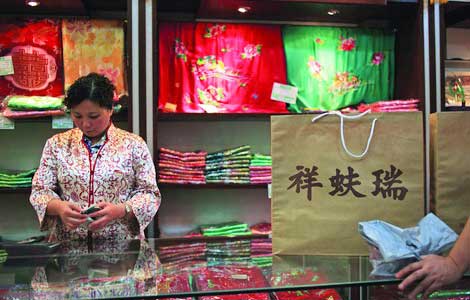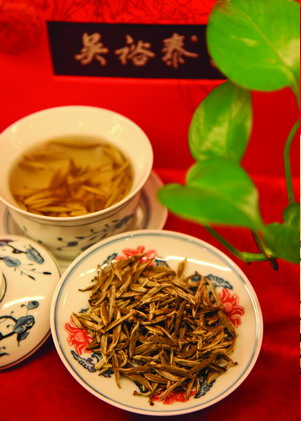New products give vitality to time-honored brands
Updated: 2012-04-21 10:15
By Xiao Xiangyi (China Daily)
|
||||||||
|
 |
|
A sales assistant at a Ruifuxiang store in Beijing. Ruifuxiang, a time-honored Chinese silk shop, also sells ready-to-wear clothes, giving more choices to customers. [Photo / Provided to China Daily] |
Laozihao, which means time-honored brand in Chinese, is an honor granted by the Ministry of Commerce to enterprises whose brands have stood the test of time and are widely recognized.
In other words, these are old companies. Most critics say they are dying off, being swallowed up in competition with multinational firms. But a handful of brands in China, which have recognized that their days are numbered if they don't innovate and refashion their image, have clawed back to life in the past few years.
China has recognized 1,000 companies as time-honored brands, such as Tongrentang, a maker of traditional Chinese medicine, and Quanjude, a chain of restaurants that specialize in Peking duck. Most have stayed the course through the decades.
Take Wuyutai for example. The tea company, established in 1887, won over a much younger customer base by introducing maccha green tea ice cream three years ago.
On a recent afternoon, a long line of young people were waiting to buy Wuyutai ice cream in Beijing's Wangfujing Street, a busy and hectic shopping area.
Sun Danwei, Wuyutai's general manager, said sales of the ice cream can be as much as 20,000 yuan ($3,170) in one Wuyutai store on a typical Saturday.
Soon after the success of the ice cream, Wuyutai introduced tea-flavored chewing gum and tea mooncakes through the help of institutes including Zhejiang University and the Chinese Academy of Agricultural Sciences. The company is also designing tea-related health and beauty products.
"Most of China's time-honored brands are endangered. But it is good to see some of them, or more exactly very few of them, are at least seeking a breakthrough by reevaluating and meeting the demands of the ever-changing market," said Kang Yan, vice-president of the China division of Roland Berger Strategy Consultants, a major consultancy in Europe.
 |
|
Wuyutai, established in 1887, is famous for its high-quality tea. [Photo / Provided to China Daily] |
The story of the decay of time-honored brands in China is nearly as old as the brands themselves. After the launch of the nation's reform and opening-up policies in the late 1970s, which ushered in a lowering of hurdles for foreign imports, some indigenous brands merged with transnational companies by setting up joint ventures. For the most part, however, local enterprises were on their own in the battle to maintain their brands.
Slowly, companies new to China began pushing out these time-honored brands. But through new products, fresh marketing strategies and improved management, several of China's legendary brands have withstood the test of time.
"Time-honored brands are not necessarily old-fashioned. People usually see the old brand Coca-Cola as modern because it has such a dynamic and trendy image," Kang said.
The transformation of these time-honored brands mostly began through an expansion in the range of their products. New products have become a growth point for aging enterprises.
One time-honored brand, Wangzhihe, established in 1669, has found success by doing just this. After hundreds of years of selling fermented bean curd, the company earned more than 100 million yuan in 2011 from sales of cooking wine.
Wangzhihe's cooking wine is a mixture of rice wine and spices, such as pepper and anise seed, as well as ginger. The company's cooking wine is currently one of the top choices for Chinese customers because of its brand power and unique flavor.
Chen Hongxuan, Wangzhihe's general manger, said the choice to focus on wine was a natural one.
"It is quite common for a Chinese family that cooks once a day to use a bottle of wine a month because it is almost a must for cooking," Chen said. "But not every family would buy the fermented bean curd."
Wangzhihe makes nearly 100 different types of sauces, including sesame oil, soy sauce and sweetened bean paste. Its newest product is a refined fermented bean curd with a lower salt content that is tailored for elderly customers. Through its wider range of products, the company is aiming to generate 800 million yuan in sales this year.
Most time-honored brands experienced decades of being operated jointly by the State and private owners since the 1950s, but were left without the shelter of the government after the launch of reform and opening-up.
"That's when we got the first stimulation to rely on ourselves, and were determined to reshape our brand," Chen said.
The brand is registered in 41 countries around the world, which Chen said has helped in boosting sales overseas. Wangzhihe began exporting its goods in 2001. Most of its overseas consumers are Chinese who live abroad, but more than 90 percent of Wangzhihe's sales take place in the Chinese mainland.
But "another reason why we've maintained double-digit growth since 2000", Chen said, is because the company has evolved how it produces its goods.
Wangzhihe opened its first factory in 2000, and now has manufacturing plants in nine provinces. It soon will have its own design facilities to create new products.
"Wangzhihe has its own advantages," Kang said.
With its own manufacturing plants and design facilities, Wangzhihe can build upon its distribution network.
Another example of a Chinese brand that has altered its business model is the silk shop Ruifuxiang. The shop was founded by Meng Luochuan - a descendent of the Chinese thinker Mencius - in 1893 in Beijing. By the beginning of the 20th century, it had grown to become the biggest silk and cloth shop in the capital.
But instead of simply providing fabric, the Ruifuxiang store in Qianmen, another shopping street in Beijing, provides a number of choices, including silk scarves, silk quilts, pajamas and qipao, a tight-fitting women's dress.
"People are more likely to buy ready-to-wear clothes, so we sell half fabrics and half finished goods," said Wang Qiang, Ruifuxiang's sales and marketing manager.
"In order to maintain our tradition and target high-end customers, we have not quit selling cloth, so we provide new services like tailoring accordingly. After all, Ruifuxiang started off by selling fabric."
The brand's silk quilts are particularly hot items for Chinese customers, who buy them as gifts for newlyweds. Tailoring, Wang said, is the company's way of being innovative and also preserving its tradition.
Ruifuxiang had 106 chain stores around China in 1927, but none of these remained after the "cultural revolution" (1966-76).
"The chains used to be called lianhao in Chinese tradition, and each chain store was a duplication of the original one with the same standard of commodities and service," said Sun Danwei from Wuyutai, which currently has more than 260 chain stores across China.
When Wuyutai started to adopt the chain-store model in 1997, competitors reacted with indifference.
"But we still decided to have chain stores when I saw more customers coming from afar to buy our tea. That was not only out of consideration for their convenience, but also in order to reshape ourselves into a well-known brand," Sun said.
Wuyutai expects to have more than 300 chain stores by the end of this year. For years it has opened chain stores at an annual rate of 50 and a ratio of one chain store to five franchisees.
The company's total revenue in 2009 was 540 million yuan and 590 million yuan in 2010. Wuyutai achieved 20 percent year-on-year growth in 2011, Sun said.
The biggest challenge for the chain-store model is the management of those outlets. To this end, Sun invited Chinese IT giant Lenovo to develop a management information system in 2001.
Pushing and expanding existing business models has been key to the success of several of these time-honored brands.
"Time-honored brands live longer than others mostly because of their pursuit of and insistence on certain core values," Kang said.
Many founders of China's time-honored brands were scholarly businessmen during the feudal era. Since Confucianism had a great influence, they believed in integrity and honesty. Unlike Western brands, China's time-honored brands did not have a constant market for growth. Wars and the "cultural revolution" brought the economy to a standstill, Kang said. But through it all, some brands have survived.
"That means quality is the soul of a company. China is developing at a high speed and it is a fast-paced era. If a brand, not only a time-honored brand, wants to become a global brand, it has to be persistent and resolved in pursuing quality," Kang said.
"But quality does not mean luxury. Sam Walton's Wal-Mart is not a luxury brand. Even a sewing needle can have the best quality among needles at the same price."
xiaoxiangyi@chinadaily.com.cn

 Relief reaches isolated village
Relief reaches isolated village
 Rainfall poses new threats to quake-hit region
Rainfall poses new threats to quake-hit region
 Funerals begin for Boston bombing victims
Funerals begin for Boston bombing victims
 Quake takeaway from China's Air Force
Quake takeaway from China's Air Force
 Obama celebrates young inventors at science fair
Obama celebrates young inventors at science fair
 Earth Day marked around the world
Earth Day marked around the world
 Volunteer team helping students find sense of normalcy
Volunteer team helping students find sense of normalcy
 Ethnic groups quick to join rescue efforts
Ethnic groups quick to join rescue efforts
Most Viewed
Editor's Picks

|

|

|

|

|

|
Today's Top News
Health new priority for quake zone
Xi meets US top military officer
Japan's boats driven out of Diaoyu
China mulls online shopping legislation
Bird flu death toll rises to 22
Putin appoints new ambassador to China
Japanese ships blocked from Diaoyu Islands
Inspired by Guan, more Chinese pick up golf
US Weekly

|

|






